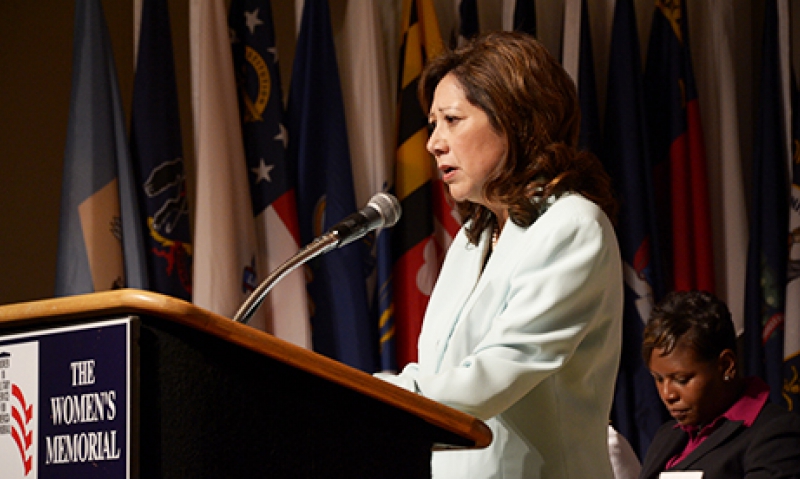
American Legion commends Department of Labor, Solis for creating "sorely needed resource."
The community of women military veterans now numbers 1.8 million and is projected to reach 2.1 million by 2036. This will result in an ever-increasing need for physical and psychological services for women veterans - especially those who become homeless.
This concerns Secretary of Labor Hilda Solis. About 18 months ago, she commissioned the creation of a guide for providers of services to homeless women veterans, such as The American Legion and other veterans service organizations, as well as state, municipal and private support agencies. The document, "Trauma-Informed Care for Women Veterans Experiencing Homelessness: A Guide for Service Providers," was unveiled this month and is available here.
"With women veterans being the fastest-growing cohort within the homeless community, this guide for service providers and other stakeholders will make a significant difference in resolving this problem," said Joe Sharpe, The American Legion's Economic director. "The American Legion commends DoL for its support and efforts in helping to eliminate homelessness among women veterans."
In a ceremony at the Women in Military Service For America Memorial building at Arlington National Cemetery, Solis joined colleagues to tell of the guide's importance, as well as address the root causes of homelessness among women veterans.
"It's strange that, as the secretary of Labor, I have the ability to work on issues like this," Solis said, "because most people would tell me that, ‘Secretary, you're going out of your lane. Your area's really about jobs, which it is - job creation and worker protection and safety.'
"But, when you talk about women veterans, it's a big part of what I believe and what I carry with me. The day that Sara (Manzano-Diaz, director of DoL's Women's Bureau) started working for us, I told her that I had a couple of goals for (her), one of which was to, obviously, raise this issue but to make sure that we could do it in a way that could bring attention, to shine a light. Maybe I did go out of my lane a little bit, but that's what this is about. It takes a voice. My belief is that here in America, no woman should ever have to come home to be homeless."
Among those to speak at the event was one of the most decorated women in military history, U.S. Air Force Brig. Gen. Wilma Vaught, who said, in part:
"I think about the women serving today. They can be suffering trauma from what they did, what they saw, their injuries - some of which leave them permanently disabled - from sexual assault, or it can be something about their return. I know from my own experience that when you have served in the military, particularly if you have served during a conflict, when you get home and people say ‘tell me about it', well, you get through a few sentences and you realize they just don't understand, and the conversation ends.
"So you keep all that within yourself when, really, you need to be talking about it. Or you decide to get out of the service and you find that, in the economy the way it is, or based on your skills or based on your lack of understanding about how to go about translating your skills, you can't find a job, and that becomes depressing.
"Some of these women get so depressed and just can't find a place and the cycle starts. Maybe it's alcohol, maybe it's drugs - and they end up homeless. And some of them have children and they are sleeping in their cars. They have no place to go. We need to help them."
Another speaker, Rep. Gwen Moore of Wisconsin - co-chair of the Congressional Caucus for Women's Issues - addressed another cause of distress to women in the military and, consequently, post-service problems.
"I can tell you that domestic violence - violence against women - and the plight of our military women abounds in the minds of the women on both sides of the (congressional) aisle," she said. "When we realize that women are the fastest-growing population of veterans, when we realize that women are four times more likely to become homeless than men veterans ... when we realize that women are raped at a substantially greater rate than women in the general population, (then) we understand why the Department of Labor ‘s Women's Bureau has been so adamant in putting together this guide for service providers."
Verna Jones, director of The American Legion's Veterans Affairs and Rehabilitation Division, welcomes DoL's effort. "This guide is a sorely needed resource," she said. "As our recent online survey demonstrated dramatically, women veterans are woefully misunderstood and underserved.
"We are anxious to partner with the Department of Labor to help inform service providers and the public about the plight of women veterans. Through better education will come better treatment. It's what our women deserve."
-30-
- Careers

